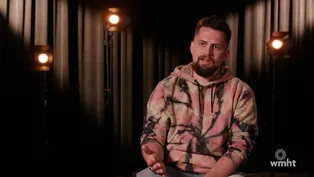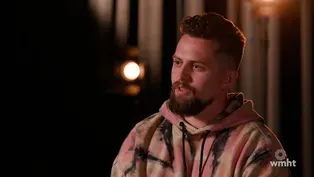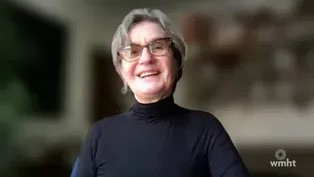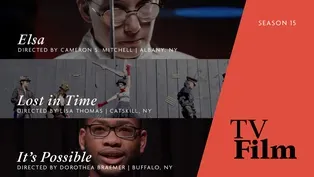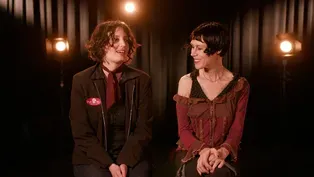TvFilm
ELSA | Lost in Time | It's Possible
Season 15 Episode 1 | 28m 45sVideo has Closed Captions
Join our host Jermaine Wells to watch three short films on TVFilm.
Join host Jermaine Wells on TVFilm for three indie shorts: Cameron S. Mitchell's "ELSA," featuring a Deafblind fencer/author's struggle for recognition; "Lost in Time," a hypnotic journey by Lisa Thomas and the Dust Bowl Faeries; and "It’s Possible" by Dorothea Braemer, showcasing Buffalo climate activists' strategies against the climate crisis.
Problems with Closed Captions? Closed Captioning Feedback
Problems with Closed Captions? Closed Captioning Feedback
TvFilm is a local public television program presented by WMHT
TVFilm is made possible by the New York State Council on the Arts with the support of the Office of the Governor and the New York State Legislature.
TvFilm
ELSA | Lost in Time | It's Possible
Season 15 Episode 1 | 28m 45sVideo has Closed Captions
Join host Jermaine Wells on TVFilm for three indie shorts: Cameron S. Mitchell's "ELSA," featuring a Deafblind fencer/author's struggle for recognition; "Lost in Time," a hypnotic journey by Lisa Thomas and the Dust Bowl Faeries; and "It’s Possible" by Dorothea Braemer, showcasing Buffalo climate activists' strategies against the climate crisis.
Problems with Closed Captions? Closed Captioning Feedback
How to Watch TvFilm
TvFilm is available to stream on pbs.org and the free PBS App, available on iPhone, Apple TV, Android TV, Android smartphones, Amazon Fire TV, Amazon Fire Tablet, Roku, Samsung Smart TV, and Vizio.
Providing Support for PBS.org
Learn Moreabout PBS online sponsorship(bright music) (upbeat music) - Welcome to "TV Film."
I'm Jermaine Wells.
"TV Film" showcases the talents of upstate New York media makers across all genres.
In this episode, we present three films from across the state.
A DeafBlind fencer and author fights with the pen and the sword just for the right to be seen, in "Elsa" directed by Cameron S. Mitchell.
- The production process of "Elsa" was actually that I pitched the idea to "PBS American Masters."
There was some funding left over from a grant they were using to make the Helen Keller documentary, and so I got connected through one of the groups I'm involved in, Forward Doc, which is a group for disabled documentary filmmakers.
Spoiler alert, I'm disabled, just invisibly.
I have a spinal cord injury.
I also have ADHD, sleep apnea, neurodivergence, so things that aren't apparent, which was always actually a struggle for me as a filmmaker.
Just finding those groups that I identified with, so Forward Doc has been a huge part of that for me.
It was a super collaborative process.
We like to say that the film is the first film to feature a DeafBlind person on their own terms, A DeafBlind woman, because that was the concern from the get go, is that we wanted to forefront the subject.
We didn't want anything kind of portraying or filtering or passing through.
Obviously it passes through my lens, right?
So there's some filter there but it was such a close connection, and almost at times felt like we were one.
In pitching "Elsa," what we were trying to offer to expand on Helen Keller, the Helen Keller documentary is a modern DeafBlind role model.
We wanted the representation of somebody living right now who's living with DeafBlindness, and that was Elsa Sjunneson.
And if you watch the film you also learn there's literally an infinite expressions of DeafBlindness.
So no two Deafblind people are alike.
I want my films to get across very plainly the experience of disability, and hopefully maybe help people to understand how disability can help all of us, now as we're living through this chaotic world that we're living in.
And you know, in filmmaking is empathy, at the bottom of it.
And so, disability is empathy too.
You know, living disabled experiences and understanding them requires empathy, but not like a kind of pity empathy, like, "Oh, I'm sorry for you," but a a real empathy, a real lived and understood empathy.
(gentle music) - I've always come into rooms with a force and I've always been the kind of person who doesn't take no for an answer if there's an injustice to be dealt with.
I think a lot of people hear the word DeafBlind, and they assume that I'm going to be quiet.
And I am loud, I am snarky, I'm sarcastic, I talk a lot.
Those are things that I think surprise people.
I am Dame Elsa of the Order of the Bat.
I am a night errant against ableism.
I wear vintage dresses, and I deal with the problems as they come.
I am a DeafBlind speculative fiction writer, a memoirist, a fencer, a swing dancer, a hiker.
There's a misconception that people have that blind people aren't body conscious or aware of where they are in space.
There's a concept called Deaf gain, and it's the idea that Deaf people don't just have a loss.
There's also a gain to being Deaf because you have that laser sharp focus.
There are no two DeafBlind people that are exactly alike.
The spectrum is so vast that I can't even really explain it.
I remember my coach looking at me as I like, took out my hearing aid and put my glasses down, and I looked at him and he was like, "You realize you're better than everybody else on this team right now."
I had the ability to just focus on being in the water and swimming.
I ski better downhill without my hearing aids in, because I stop processing the world through my ears, and I process the world through my feet.
When I'm fencing, I process through my sword.
I don't necessarily process through my eyes.
I only need one touch point, whether it's my cane on the ground, even for an instant, or my sword in the air connecting with yours.
And from that point, I can basically model my whole world off of that body awareness.
I'm pretty sure they're going to try and take advantage of my blindside.
So I move my arm out, block with a parry.
And what I know is that their sword just connected really hard with my sword.
Nine years old, I was going to a French camp in the San Juan Islands.
I remember getting to pick up the sword for the first time, and I remember that it was a cool summer breeze and that I could see the pine trees, and the sun, and I could smell the ocean.
And I got to fence.
I got to be a knight.
Nobody had ever told me I couldn't, but also nobody had ever told me that I could.
It was a complex upbringing.
My parents were told that they should put me in an institution and have another baby after I was born, by my pediatrician.
And I heard that story, and I remember sort of thinking about how awful that seemed.
My parents responded to the concept of institutionalizing me with a no, because they really wanted a kid, and I don't think that they had planned to have another one.
So I have a lot of empathy for my parents.
But I also feel like there was a certain degree of hiding my disability that happened.
When you're being raised by queer parents who were living with the reality of the AIDS crisis.
My father had AIDS.
I think he knew that he had an illness he was disabled by.
There were a lot of things to hide because society told us to.
My father taught me how to be an advocate for disabled people and queer people everywhere.
I've been writing about the topic of sort of disability representation and media for 10 years.
And at a certain point you have enough material that you need to write a book, because you've written too many essays.
(laughs) I woke up one morning and there was an email from Marvel in my inbox.
Here's an email that says, "Want to write for Marvel, the Women Anthology?"
And I said yes, because that's what you do when you're a comic book nerd and an email from Marvel lands in your inbox.
This is "Women of Marvel #1," which I was lucky enough to be a part of.
And I got to write Peggy Carter, which was pretty cool.
They made a disabled woman look competent, and awesome, and they didn't for one second make her disability about fetishization.
And I felt like the artist really got what I was asking for.
I went to the comic bookstore to buy my own copy and I walked in and I was like "Do you have 'Women of Marvel #1?'"
And they were like, "Yes, we do."
And I picked it up and I was like, "Yeah, so, I wrote this."
(laughs) And the comic book nerds were very excited.
And then there's "Disabled People Destroy Science Fiction" which I co-edited with Dominik Parisien, and this won the Hugo Award in 2019.
I'm working on a novel that is about what happens when in the future, We have companies that own biotech.
And so it's about the disabled hackers who are trying to stop the erasure of disability from the future world.
It's important to me to work in the genre, because I want there to be disabled people in the future.
I want us to imagine disabled people in the future.
I want to be in the future.
When I was much younger, there was a picture book about Helen Keller that we read in my elementary school.
And then we watched The Miracle Worker when I was in high school.
When I was a kid, the representation that I got was she learned how to speak by standing next to a water pump by her teacher.
And that was kind of it.
And if you are a DeafBlind kid who's oral, who speaks a mile a minute, you're not going to resonate with that.
We only ever hear the story up until she signs water at the water pump, and then we forget that she was also a socialist, that she performed on vaudeville circuits.
Like, this was a completely different person, but we choose as a society not to look at her as an adult.
There is a burning fire in my chest every single day, and it has been there since I was a little girl.
And I think that that rage comes from existing in a world that wants to define me, constantly, based on their own decisions of who I should be.
Sometimes I'll be on Twitter minding my business, and somebody will roll along and say, "You're using a sighted Twitter client you're not really blind."
And then I will get really angry, because nobody gets to tell me who I am.
Perspectives of disabled people need to be seen.
Being seen as important and being a part of society is important.
I hope people don't forget that.
They don't need a degree in disability studies.
They don't need to be disabled they just need to be willing to listen.
Every single piece of work I do is about forcing my way through the door.
(calm music) - In our next film, Lisa Thomas and the Dust Bowl Faeries take us on a hypnotic cinematic journey in "Lost in Time."
- The directing that I've been doing, which has basically been happening for like the last like five, six years, really started to come about when I started to make music videos with the Dust Bowl Faeries.
Like, back in the eighties or whenever MTV came about, there would be these like longer format music videos that were much more like, narrative.
To me, I always felt like there was an opportunity to do much more than just like, a band performing and good angles of them on a stage or something.
And so that was when I started to kind of coin this phrase music novella.
- A friend of mine, Dennis Herbert, wrote the song.
Myself and Dennis and the Dust Bowl Faeries all work on the music, and then we work on our characters based on what Lisa sort of wants.
And the film aspect of it is mostly Lisa's vision.
Maybe the message that I get from the song is like, time's ticking, you know, and make the most of life now because, you know, the ship's leaving.
You don't wanna miss the boat.
There's a lot of those references in in the song.
- I already knew the song.
And when I sat down to write the narrative portion, which was about the director having this troubled day on set, there was a film that was made by Tom DiCillo some years ago that I think was what inspired me to in some ways do "Lost In Time."
His was called "Lost in Oblivion."
I think it's like, you know, this thing of, like, it's kind of hard to be a filmmaker, but you just have to kind of continue and persevere.
Filmmaking's a crazy venture.
(gentle music) - Thank you.
- Wake up!
Wake up!
- [Blake] What was that hippie yelling about?
- [Shay] God only knows.
People upstate have such a Lynchian vibe.
- Totally.
- Your future is leaving soon!
- Geez, something's got this guy going.
- (indistinct) on the bike.
Upstate New York's weird.
(bell rings) Wait, did you buy goat cheese for the crew?
I know it's your weakness.
- [Blake] What are you the vegan police?
Hey, I saw you last week eat a fish taco on Charlie's set.
Your secret's safe with me though.
- Okay, well listen, Shay.
I didn't give you grief when you decided to go all cannibal and eat a sausage yesterday.
- Okay, so yeah, the difference between you and me is that I don't proclaim to be totally vegan.
I am a cheating vegan.
- Yeah.
Okay.
You make no sense.
- None of us do, Blake.
None of us do.
- Okay, that works.
But there just, there needs to be more.
Okay.
All right, everybody, everybody, okay.
This is our last day on set of "A Faerie Good Year."
Okay.
- Such a stupid title for a film.
- So, let's stay focused.
Let's have some fun.
- Hey, Jude, let's try and be helpful today on set, okay?
- Do you want me to go get some coffee?
- We have coffee on set.
- You call that coffee?
- Hey, you might got a problem with Bex.
- No, no, no.
I set your call time earlier so that this wouldn't happen.
- Oh, her makeup's done.
But she's pitching a fit about her outfit.
- She chose that outfit.
- I don't know what to tell you but she's not coming to set and you need to talk to her.
Fine.
Where's Sal?
- Bex, it's Blake.
Can you let me in?
Bex?
Does anybody have the key?
- Eddie, I'm having difficulties on the set of a "A Faerie Good Year."
You need to call me back.
- Hey Bex, we're ready for you on set.
how are you feeling?
- I'm not feeling it.
- I don't understand.
You were so into the character yesterday.
- This outfit is stupid.
- [Blake] We chose this outfit together.
You loved it then.
- That was then.
I'm living in the now.
- What are you talking about?
You said it was perfect for the character in keeping with the whole aesthetic of what we're going for for her character development and the story arc.
- Why are you making this film?
- What?
- Why do you make films?
- To tell stories that otherwise might not be told?
- You're making a film called "A Faerie Good Year."
Be sincere.
- I am being sincere.
(Bex laughs) - Your film, it's fluff.
The film is fluff.
- I'm not having this conversation with you right now.
You need to finish what we started, Bex, or we will never get into Rando!
- Rando.
Are you kidding me?
Everybody in the industry knows that Rando is a total scam.
- What's gotten into you?
We've been talking about for years how we're gonna win that, Bex!
Bex!
What?
(Bex huffing) - My CBD gummies!
- Oh my God.
Oh my God.
- Guys, the art girl that was on set?
She's kind of trying to hijack the scene.
- [Blake] Our production designer?
- Yeah.
- Are you kidding me?
This is what I'm talking about.
- Yeah, she kind of got on stage with a ram.
- A what?
- A ram.
You need to get this- - [Blake] Oh my god, I gotta go.
- Could you be a doll and get me a burrito?
- I'm not your servant.
- Do you know who I am?
You're a PA!
- F off, Bex.
But from one fairy film foe to another, she probably has some CBD gummies in her purse.
("Lost in Time" by Dust Bowl Faeries) - Ryder, is everything okay?
♪ Tick tock, tick tock ♪ ♪ Tick tock, tick tock ♪ ♪ And so the time has come ♪ ♪ The clockmaker's ship ♪ ♪ Is setting sail at sunrise ♪ ♪ You can make it if you run ♪ ♪ Tick tock, tick tock ♪ ♪ The moon is up, get out of bed ♪ ♪ The witching hour has come and gone ♪ ♪ No one likes a sleepy head ♪ ♪ Out in the cornfields ♪ ♪ Sleeping and dreaming ♪ ♪ Wake up, wake up, wake up ♪ ♪ Your future is sailing soon ♪ ♪ Hear the bells ringing ♪ ♪ Tolling for you ♪ ♪ Calling for you ♪ ♪ Knock, knock ♪ ♪ Who's there ♪ ♪ Everyone's on board ♪ ♪ The ticking of a thousand clocks ♪ ♪ Pulling us away from shore ♪ ♪ Tick tock, tick tock ♪ ♪ Time begins to fly ♪ ♪ The ship is moving faster ♪ ♪ Soon you will be leaving ♪ ♪ Everything you knew behind ♪ ♪ Up in the crow's nest ♪ ♪ Staring for hours ♪ ♪ Out at the endless sea ♪ ♪ Sound of the sirens' song ♪ ♪ Bathing forever ♪ ♪ Frozen in time they'll be ♪ - Shay, did we get all that?
- It's me, Bex.
And yes, I was rolling on the whole dang thing.
I don't know where your cheatin' vegan DP is, but can somebody get me real breakfast so I can do my scene?
- Someone get her a real breakfast.
- Thank you.
("Lost in Time" by Dust Bowl Faeries) ♪ Tick tock, tick tock ♪ ♪ The whole wide world is swirling down ♪ ♪ All the clocks have stopped ♪ ♪ The ship begins to drift ♪ ♪ Floating round and round and round ♪ ♪ And then it's gone ♪ ♪ As if it's never been ♪ ♪ The vulture looks around (indistinct) ♪ ♪ Clear and warm and welcoming ♪ ♪ Under the sea, they go ♪ ♪ Where they were meant to be ♪ ♪ Dreams rarely do come true ♪ ♪ Honor the sea ♪ ♪ Happier than they've been ♪ ♪ Or they will ever be ♪ ♪ Together through it all ♪ ♪ Happily ever ♪ ♪ After all ♪ - Finally, climate activists from Buffalo, New York share their strategies on how to tackle the climate crisis in the film "It's Possible" by Dorothea Braemer.
- I wanted to create a film that showcases positive work that is being done in the climate change movement, for people, specifically for an audience of people who do believe that climate change exists, who do feel like it's a crisis, but who do feel like maybe they themselves cannot contribute to creating positive change in that direction.
What I did is I invited a whole bunch of climate activists that I know and admire and talk about specifically addressing three questions, or three prompts, which were, it is too late, I can't make a difference, and it is too complicated.
And I asked them to address those three prompts with their answers so that they hopefully will empower other people to act rather than feel like they can't make a difference.
I think it's so important to realize that we have this new generation of young people that are very angry about how we are leaving the world to them.
And we also have older people that have an entire history of activism.
And so we need to hear from all groups, all ages, you know, and stop the isolation, in some ways, that you sometimes feel when you just read about some other, you know, horrible climate thing that's happening.
You know, we need role models, and I think media can be a great way to create that.
- My name is Gabrielle Prince, I'm 17 years old.
And I don't wanna have a conversation with my grandkids one day that goes something like this: "Grandma, why didn't you do something about it?
The climate crisis?"
And I'll have to tell them or lie that I was a big chicken.
But they might not understand chicken because it'll be outdated by then.
So I'll have to tell them that I felt too weak, too isolated, too young, too small, too uneducated, unworthy, unrespected, any one of those things.
I'll tell 'em, I made excuses that I was too chicken.
- I think we as a people practice a lot of excusiology.
You know, when it comes to doing something we are like, "Well, um..." We got all kind of excuses why we don't engage.
And if truth be told, when it comes to climate change, the whole question of it, we're still playing some games.
So when I think about too big, too complicated, too late, I see them from a personal stance for, I used to use those words when I wanted to get out of something.
"Jim, take the garbage out."
"I tried to, mom, but it's too big for me to carry!"
- Climate change is complicated but it's not too complicated for you to do something about.
In fact, despite how scary climate change is, and what, you know, our futures may look like, the great news about climate change is that we actually know a lot of the solutions that we need to implement.
We have the technology and tools it'll take to transition away from fossil fuels to a renewable energy economy.
We have policies and you know, papers, and fact sheets and transition plans that are made and just sitting on shelves.
The thing that we're really missing in order to fight climate change is the political will of our elected officials.
And the good news about that is that everyone can do a small part to push that political will forward and make a difference.
- You may wonder what can you do personally?
And there is much, such as eating a plant diet.
And if you can't be a vegan, that's okay cuz I'm not either.
I just advised to cut back however you could.
- I have been a climate activist for seven months.
I have also used Instagram for seven months.
In those seven months, I have not been able to understand Instagram at all.
It's too complicated.
But climate activism?
Honestly, 99% of climate activism is just going outside and showing up to things.
- And you can even start just by talking to your friends, talking to your family, you know, at the dinner table, just making sure everyone that you know knows that this is an issue that's important to you.
- I grew up and I used to make fun of people who were doing the climate change stuff, who would talk about the issues.
And then over the summer, like, the Amazon wildfires happened and like, the world was literally on fire.
Like, on fire.
And that was it.
That changed me for life.
- Well, I'm an old lady.
I've been around for a really, really long time and have been an activist for a really long time.
And people say to me, "Well, you know, you're old you don't have to do things anymore."
- I was always kind of scared, or I guess a little embarrassed to like, you know, go out there and protest.
But then you see them, you see people who are young.
I'm 21, you see people who are like 17, 16 and they're like, they're walking down the street, skipping school, you know, talking about climate change.
And it's like, if they can do that, like, I can, you know I can join, I could do it too.
It's not that hard.
- I like to pick up an African proverb that it says, "How do you eat an elephant?"
And the answer is "One bite at a time."
- So all of us, especially us old folks, because guys, we lived the hay, the life of Riley.
We were the ones that got all the benefits from this overconsumption and this overcarbonization of the world.
So we should be the ones standing with the youth day after day after day, to say, "I won't live in a world like this.
Another world is possible."
- The easiest way to give up your power is to believe that you don't have any.
- Learn more about the films and filmmakers in this season of "TV Film" at wmht.org/tvfilm, and be sure to connect with WMHT on social media.
I'm Jermaine Wells.
(dramatic music) - [Narrator] "TV Film" is made possible by the New York State Council On The Arts, with the support of the office of the Governor and the New York State legislature.
Cameron S. Mitchell on Accessible Film Sets
Video has Closed Captions
Learn how accessibility was integrated into the production design of "ELSA." (1m 59s)
Cameron S. Mitchell on Creating Access Using Captions & ASL
Video has Closed Captions
Discover the magic of accessible films with captions, ASL, and audio descriptions. (2m 14s)
Dorothea Braemer on Using Your Voice in Filmmaking
Video has Closed Captions
Dorothea Braemer believes the filmmaker's mission: connect with others & express yourself. (1m 44s)
ELSA | Lost in Time | It's Possible: Preview
Video has Closed Captions
Join our host Jermaine Wells to watch three short films on TVFilm. (23s)
Lisa Thomas and Ryder Cooley Talk Songwriting, Set Design
Video has Closed Captions
Go behind the scenes of making the music novella "Lost in Time." (2m 21s)
Providing Support for PBS.org
Learn Moreabout PBS online sponsorshipSupport for PBS provided by:
TvFilm is a local public television program presented by WMHT
TVFilm is made possible by the New York State Council on the Arts with the support of the Office of the Governor and the New York State Legislature.
